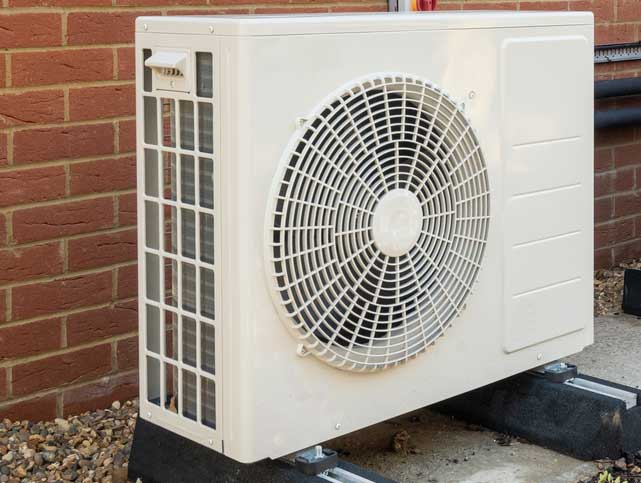Landlords Heat Source Pump Grants Coming Soon
Published on November 30, 2021 by Sarah Mac

The Autumn 2021 Budget confirmed that landlords were included in the government’s heat source pump grant scheme.
The scheme will provide landlords with access to grants of £5,000 to help replace gas boilers in rental properties with air or ground source heat pumps from April 2022.
The grants form part of the government’s Heat and Buildings Strategy which sets out how the UK will decarbonise homes and commercial and industrial property as part of the path towards net zero by 2050.
Gas central heating systems are used to provide heat and hot water to most rental properties in the UK. But they produce twice as much climate-heating carbon emissions as all the nation’s gas-fired power stations combined, according to research.
For this reason, the government will be banning the sale of gas boilers from 2035. Which means landlords will need to find an alternative.
How much do heat source pumps cost?
Air source and ground source heat pumps are considered viable alternatives. However, they are significantly more costly than gas boilers.
The Energy Saving Trust estimates that a typical air source heat pump installation will see landlords having to invest in the region of £6,000-£8,000. Ground source systems can cost between £10,000 and £18,000.
The cost depends on the size of the property, and the type of equipment being installed.
So, whilst the £5,000 grant may appear generous, in most cases, it will only form a small proportion of the cost.
Official NRLA comment
The National Residential Landlords Association (NRLA) is critical of the government’s scheme, commenting that it has “again failed to provide the clarity needed by private landlords to plan for the future of their businesses”.
NRLA chief executive Ben Beadle said, “Eighty per cent of private rented households have gas central heating and replacing such systems will be both costly and vital to achieving net zero.
“Providing grants to assist householders and landlords to install heat pumps is a welcome step, but much more is needed to make the Government’s targets achievable.
“Once again private landlords have been left waiting for the government to publish details of the standards they will be required to comply with, the deadlines they must meet, and how such work should be funded.”
How do air source and ground source heat pumps work?
Heat pumps are not a new technology. They have in actual fact been used for many years.
They take heat from the air or the ground, using it to heat radiators, underfloor heating, warm air convectors and hot water.
A heat pump extract heat from the air or the ground much like a fridge extracts heat from its interior.
Heat pumps can work effectively even in cold temperatures, including down to minus 15 degrees Celsius. The extracted heat is converted into a fluid, which then flows through into a compressor, where its temperature is increased. The higher temperature then moves into the heating and hot water system of the property.
What are the advantages and disadvantages of heat pumps?
Whilst energy costs and carbon emissions are lower with heat pumps, the fact remains that they need electricity to operate, which means that the system cannot be classed as completely eco-friendly, and definitely not carbon neutral.
However, heat pumps do produce less carbon emissions than gas boilers. Plus, whilst the equipment will require a yearly service, from a maintenance point of view, there is very little to be concerned about. So there are cost savings to be had there in the long term.
The external units required by heat pump systems do take up outdoor space, and this will need consideration, especially if there is little space available. Air source heat pumps are smaller than ground source heat pumps, but the external unit will still need to be fixed onto a wall or housed on the ground. In urban areas, this can often prove problematic.
Another thing to think about is how noisy heat pumps are. The external unit, whilst not overly noisy, does emit some degree of sound. So, in quiet neighbourhoods, this will need consideration. It’s also important to factor in aesthetics. Ground source heat pumps tend to be less intrusive as much of the equipment is fitted underground. However, air source heat pumps are mostly above the ground, which means they will be visible.
Is it advisable for landlords to replace gas boilers with heat pumps?
We all need to accept that reducing carbon emissions is something that has to be taken seriously. With the phasing out of gas boilers over the coming years, landlords will need to start looking at alternatives for providing heat and hot water in their rental properties.
Government heat source grants are taking us in the right direction. However, whether further help will be provided for landlords to boost the energy efficiency of their properties remains to be seen.
If you are considering replacing your gas boiler with a ground source or air source heat pump, it is worth taking some time to weigh up your options and look carefully at the costs involved in the context of how much you could save over the years. Also bear in mind that an eco-friendly heating and hot water system could prove attractive to modern-thinking tenants.
You can learn more about heat pumps on the Energy Saving Trust website.

